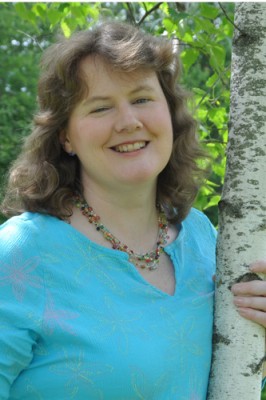Lynda Mullaly-Hunt, Neag graduate and former third-grade teacher, admits that she wasn’t always an aspiring author. “Most authors say that they’ve wanted to write since they could chew on a crayon,” says Mullaly-Hunt, “but that wasn’t true for me.”
She says she wrote One for the Murphys, a middle school-aged novel published in May by Penguin Group for Young Readers, more because it “bugged” her not to and because she kept hearing the voice of 12-year-old protagonist Carley inside her head. At the time, she had no idea whether the story would sell.
Called “a beautiful book” and “an astonishing debut,” the novel follows 12-year-old Carley Connors as she tries to adapt to a foster family environment. Coming from a less-than-ideal family situation and not used to having an attentive mother or stable family, Carley rebels against the attention she receives in this loving home. Conflict arises in the form of an unsupportive foster sibling and a biological mother who might just want Carley back in her life.
Mullaly-Hunt says the character of Carley was based partially on the vulnerable sides of herself. “I’ve known Carley forever—not the facts of her life, necessarily, but her emotional journey,” she explains. Through the process of writing One for the Murphys, Mullaly-Hunt says she has also grown attached to her characters: “Honestly, sometimes when I think about them, it makes me sad that they don’t exist in the real world. I suppose that may sound a little odd to some, but they really have become a part of me.”
 Mullaly-Hunt began writing fiction during a children’s literature course at UConn, which she took with professor Francelia Butler. “An early assignment was to choose a fairy tale and rewrite it as a contemporary story,” explains Mullaly-Hunt. “I really got into it, having used a forest-full of typing paper and a vat of Wite-Out because I kept revising.”
Mullaly-Hunt began writing fiction during a children’s literature course at UConn, which she took with professor Francelia Butler. “An early assignment was to choose a fairy tale and rewrite it as a contemporary story,” explains Mullaly-Hunt. “I really got into it, having used a forest-full of typing paper and a vat of Wite-Out because I kept revising.”
Bitten by the writing bug and recognizing its value, she went on to implement writing programs in her third-grade classroom and, eventually, join a writer’s group before composing her novel. She is grateful for her education from Neag: “Not only did I graduate well-prepared, but attending UConn made me so happy.”
Looking back at the novel-writing experience, Mullaly-Hunt says partial inspiration came from an experience she had when she was young and spent a few months living with another family. Seeing a family dynamic outside of her own opened her eyes to the possibilities of what life could be like.
The Broadway musical “Wicked” also inspired Mullaly-Hunt. She found herself playing the soundtrack while writing, something unusual since she typically does not listen to lyrical music while working. After “hearing” Carley speak her first line and beginning to get the story down, Mullaly-Hunt says, “I just had to finish it. It was like having a sliver in my hand—painful, at times, but I just had to get it out.”
After shopping the novel around, Mullaly-Hunt signed with Nancy Paulsen Books and Penguin and is excited to be a part of such an iconic publishing house. “It’s pretty amazing to step off of the elevator at Penguin and see book characters on the walls… books I’ve known and loved as a kid, teen, teacher, mom and writer,” she explains.
In addition to enjoying the success of One for the Murphys, Mullaly-Hunt is currently working on her second novel, Alphabet Soup. This novel follows the story of a new young heroine named Lucy Nickerson, as she hides behind bad behavior while struggling with her inability to read.
As a former teacher, Mullaly-Hunt says her favorite part about publishing a novel has been the reaction she’s received from children, fellow teachers and parents. “When a teacher or parent tells me that Murphys has had a ‘profound impact’ on a child, I want to thank [the teacher] for being there in the flesh for that child and caring enough to give him or her the book and then following up,” says Mullaly-Hunt, who often visits schools to talk with students about the creative writing process. “They are the real heroes.”
 Facebook
Facebook
 Twitter
Twitter
 LinkedIn
LinkedIn
